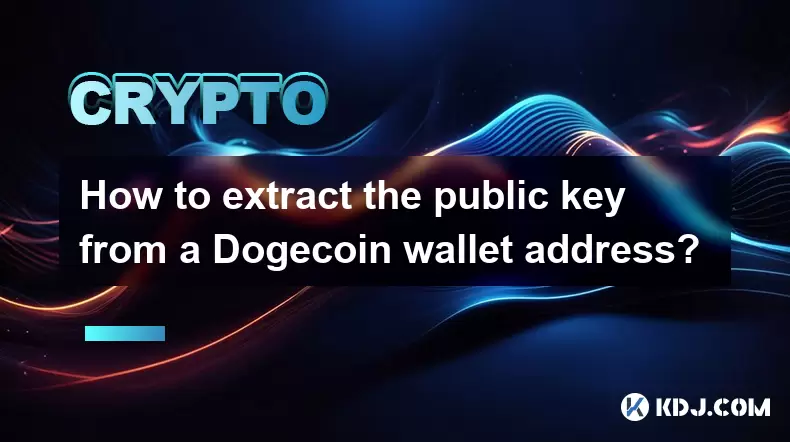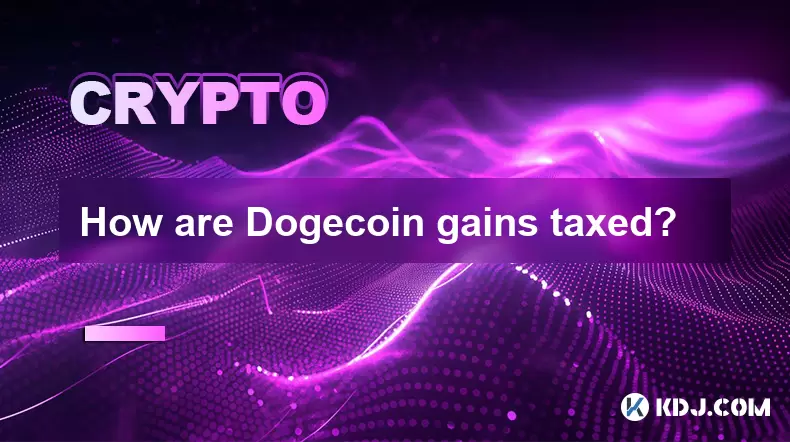-
 bitcoin
bitcoin $87959.907984 USD
1.34% -
 ethereum
ethereum $2920.497338 USD
3.04% -
 tether
tether $0.999775 USD
0.00% -
 xrp
xrp $2.237324 USD
8.12% -
 bnb
bnb $860.243768 USD
0.90% -
 solana
solana $138.089498 USD
5.43% -
 usd-coin
usd-coin $0.999807 USD
0.01% -
 tron
tron $0.272801 USD
-1.53% -
 dogecoin
dogecoin $0.150904 USD
2.96% -
 cardano
cardano $0.421635 USD
1.97% -
 hyperliquid
hyperliquid $32.152445 USD
2.23% -
 bitcoin-cash
bitcoin-cash $533.301069 USD
-1.94% -
 chainlink
chainlink $12.953417 USD
2.68% -
 unus-sed-leo
unus-sed-leo $9.535951 USD
0.73% -
 zcash
zcash $521.483386 USD
-2.87%
How to extract the public key from a Bitcoincoin wallet address?
A Dogecoin address reveals its public key only after a transaction is made, which can be extracted via block explorers or tools like Bitcoinlib for verification.
Jun 16, 2025 at 07:49 am

Understanding the Relationship Between a Dogecoin Address and Its Public Key
In the world of Dogecoin (DOGE), users often interact with wallet addresses but rarely see the underlying cryptographic components such as the public key or private key. A Dogecoin address is derived from the public key through a series of hashing operations. Specifically, the public key is first hashed using SHA-256, then RIPEMD-160, and finally encoded using Base58Check to produce the familiar DOGE address format.
This process makes it non-trivial to reverse-engineer the public key directly from an address. However, if a transaction has been made from that address, the public key is revealed on the blockchain during the verification process. This revelation happens because the signature in the transaction input includes data that allows reconstruction of the public key.
Prerequisites for Extracting the Public Key
Before attempting to extract the public key, certain conditions must be met:
- The Dogecoin address must have made at least one outgoing transaction.
- You need access to a block explorer or transaction inspector for Dogecoin.
- Optionally, you may need tools like Bitcoinlib, Pycoin, or other libraries that support Dogecoin operations.
- A basic understanding of scriptSig and signature scripts is helpful.
These prerequisites are crucial because without a prior transaction, the public key remains hidden by design for security reasons.
Step-by-Step Guide to Extracting the Public Key
To extract the public key from a Dogecoin address, follow these steps:
- Use a block explorer such as blockchair.com or blockcypher.com to search for the Dogecoin address.
- Locate any transaction where the address was used as an input (i.e., sent funds).
- Click into that transaction and find the input script (scriptSig) section.
- The scriptSig will contain two parts: the signature and the public key.
- Copy the full public key hex string from this section.
- Verify that the hash160 of this public key matches the Dogecoin address using tools or code.
This method leverages the fact that when a transaction is signed, the public key becomes part of the transaction data to allow network validation.
Using Tools and Libraries to Automate Extraction
For developers or advanced users, several libraries can assist in extracting the public key programmatically:
- Bitcoinlib: Although primarily for Bitcoin, it supports Dogecoin via custom configurations.
- Pycoin: Offers utilities for parsing transactions and extracting keys.
- Blockstream.info API: While not directly supporting Dogecoin, similar APIs exist for DOGE.
Here's a sample Python snippet using bitcoinlib:
from bitcoinlib.services.blockchain import Blockchain
blockchain = Blockchain(network='dogecoin')tx_hash = 'your_transaction_hash_here'transaction = blockchain.gettransaction(tx_hash)
for input in transaction.inputs:
print('Public Key:', input.public_key)
Ensure that the library is configured for Dogecoin’s specific parameters such as network byte and address version.
Verifying the Public Key Against the Original Address
Once you've extracted the public key, it's essential to verify its correctness by deriving the original Dogecoin address:
- Take the public key hex string.
- Perform SHA-256 hashing followed by RIPEMD-160 hashing.
- Prepend the version byte (0x1e for Dogecoin mainnet).
- Apply Base58Check encoding to the result.
- Compare the output with the original Dogecoin address.
If the resulting address matches, the public key is confirmed correct. This step ensures that no errors occurred during extraction or decoding.
Frequently Asked Questions
Q: Can I extract the public key from a Dogecoin address that has never sent a transaction?
A: No, the public key is only revealed when a transaction is made from the address. Until then, it remains concealed for security purposes.
Q: Is it safe to share my Dogecoin address?A: Yes, sharing your Dogecoin address is safe. It is designed to be publicly shared for receiving funds. However, always ensure private keys remain confidential.
Q: Why do some transactions show multiple public keys?A: Some transactions may involve multiple inputs from different addresses, each revealing their respective public keys in the scriptSig.
Q: Are there tools specifically built for Dogecoin public key extraction?A: While most tools are generic for Bitcoin-based chains, they can be adapted for Dogecoin by adjusting network parameters such as address prefixes and hash functions.
Disclaimer:info@kdj.com
The information provided is not trading advice. kdj.com does not assume any responsibility for any investments made based on the information provided in this article. Cryptocurrencies are highly volatile and it is highly recommended that you invest with caution after thorough research!
If you believe that the content used on this website infringes your copyright, please contact us immediately (info@kdj.com) and we will delete it promptly.
- Work Dogs Unleashes TGE Launch, Sets Sights on Mid-2026 Listing & Ambitious $25 Token Target
- 2026-01-31 15:50:02
- WD Coin's TGE Launch Ignites Excitement: A Billion Tokens Set to Hit the Market
- 2026-01-31 16:10:02
- Royal Mint Launches Interactive £5 Coin for a Thrilling Code-Breaker Challenge
- 2026-01-31 16:10:02
- Crypto, AI, and Gains: Navigating the Next Wave of Digital Assets
- 2026-01-31 15:50:02
- Coin Nerds Forges Trust in the Digital Asset Trading Platform Landscape Amidst Evolving Market
- 2026-01-31 16:05:01
- Blockchains, Crypto Tokens, Launching: Enterprise Solutions & Real Utility Steal the Spotlight
- 2026-01-31 12:30:02
Related knowledge

Bitcoincoin burning mechanism
Jul 20,2025 at 09:21pm
What is the Dogecoin burning mechanism?The Dogecoin burning mechanism refers to the process of permanently removing DOGE tokens from circulation by se...

How to earn free Bitcoincoin?
Jul 19,2025 at 10:08pm
What is Dogecoin and Why Earn It?Dogecoin (DOGE) started as a meme-based cryptocurrency in 2013 but has grown into a widely recognized digital asset. ...

Is Coinbase a good wallet for Bitcoincoin?
Jul 19,2025 at 04:42pm
Understanding Coinbase as a Wallet Option for DogecoinWhen considering where to store Dogecoin, Coinbase is often mentioned as a potential option due ...

How to buy Bitcoincoin with PayPal?
Jul 23,2025 at 06:57am
Understanding the Basics of Buying DogecoinBefore diving into the process of buying Dogecoin with PayPal, it’s essential to understand what Dogecoin i...

Best app to buy Dogecoin
Jul 23,2025 at 03:08pm
What Is a Cryptocurrency Exchange and How Does It Work?A cryptocurrency exchange is a digital marketplace where users can buy, sell, or trade cryptocu...

How are Dogecoin gains taxed?
Jul 25,2025 at 07:01am
Understanding the Taxation of Dogecoin GainsWhen it comes to Dogecoin (DOGE), many investors are drawn to its meme-inspired branding and volatile pric...

Bitcoincoin burning mechanism
Jul 20,2025 at 09:21pm
What is the Dogecoin burning mechanism?The Dogecoin burning mechanism refers to the process of permanently removing DOGE tokens from circulation by se...

How to earn free Bitcoincoin?
Jul 19,2025 at 10:08pm
What is Dogecoin and Why Earn It?Dogecoin (DOGE) started as a meme-based cryptocurrency in 2013 but has grown into a widely recognized digital asset. ...

Is Coinbase a good wallet for Bitcoincoin?
Jul 19,2025 at 04:42pm
Understanding Coinbase as a Wallet Option for DogecoinWhen considering where to store Dogecoin, Coinbase is often mentioned as a potential option due ...

How to buy Bitcoincoin with PayPal?
Jul 23,2025 at 06:57am
Understanding the Basics of Buying DogecoinBefore diving into the process of buying Dogecoin with PayPal, it’s essential to understand what Dogecoin i...

Best app to buy Dogecoin
Jul 23,2025 at 03:08pm
What Is a Cryptocurrency Exchange and How Does It Work?A cryptocurrency exchange is a digital marketplace where users can buy, sell, or trade cryptocu...

How are Dogecoin gains taxed?
Jul 25,2025 at 07:01am
Understanding the Taxation of Dogecoin GainsWhen it comes to Dogecoin (DOGE), many investors are drawn to its meme-inspired branding and volatile pric...
See all articles





















![Ultra Paracosm by IlIRuLaSIlI [3 coin] | Easy demon | Geometry dash Ultra Paracosm by IlIRuLaSIlI [3 coin] | Easy demon | Geometry dash](/uploads/2026/01/31/cryptocurrencies-news/videos/origin_697d592372464_image_500_375.webp)




















































